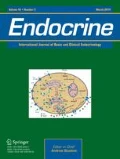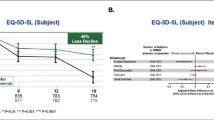Abstract
Objective
Intrinsic imperfections of thyroid hormone replacement therapy may affect long-term general well-being. In patients with Hashimoto thyroiditis (HT), cognitive functioning may be affected via altered thyroid hormones action as well as by the autoimmune process. The aim of this study was to evaluate cognitive function and quality of life (QoL) in patients on long-term levothyroxine replacement for HT in relation to thyroid function tests and TPO (thyroid-peroxidase) antibody (TPOAb) status.
Design
Retrospective cross-sectional study.
Patients and measurements
One-hundred-and thirty patients with HT on long-term levothyroxine replacement and 111 euthyroid control subjects. Both groups were divided into two age subgroups, 20–49 years (N = 59 vs N = 79) and > 50 years (N = 71 vs N = 32). Evaluation included biochemical and neuropsychological tests, evaluating attention, global cognitive status, verbal and working memory, executive function, depression and anxiety, and quality of life. We used ANOVA and partial correlations to test for significant associations.
Results
FT4 (free-thyroxine), FT3 (free-triiodothyronine) levels and FT3/FT4 ratio were not different between patients and controls. Mean TSH (thyroid-stimulating hormone) was normal in all subjects but significantly higher in the patients (20–49 yrs:3.64 ± 2.74 vs 1.93 ± 1.10, >50 yrs:3.93 ± 2.84 vs 1.91 ± 0.90). Antibodies (TgAb,TPOAb) were higher in patients. Global cognitive function (MMSE-Mini mental state examination), conceptual tracking (TMT-Trail Making Test:A/B), verbal divergent thinking (like Phonemic fluency test), and anxiety and depression scores were significantly worse in patients vs controls. QoL was impaired in patients. there was a significant negative correlation between antibodies (TPOAb, TgAb) and quality in life (total SF36 score).
Conclusion
Patients on long-term levothyroxine replacement show persistent impairments in both cognitive functioning and general well-being.
Similar content being viewed by others
References
J.A. Romijn, J.W.A. Smit, S.W.J. Lamberts, Intrinsic imperfections of endocrine replacement therapy. Eur. J. Endocrinol. 149, 91–97 (2003)
M. Ritchie, B.B. Yeap, Thyroid hormone: influences on mood and cognition in adults. Maturitas 81, 266–275 (2015)
T. Leyhe, K. Müssig, Cognitive and affective dysfunctions in autoimmune thyroiditis. Brain Behav. Immun. 41, 261–266 (2014)
J. Parle, L. Roberts, S. Wilson et al. Randomized controlled trial of the effect of thyroxine replacement on cognitive function in community-living elderly subjects with subclinical hypothyroidism: The Birmingham Elderly thyroid study. J. Clin. Endocrinol. Metab. 95, 3623–3632 (2010)
A.E. Budson, B.H. Price, Memory Dysfunction. N. Engl. J. Med. 352, 692–699 (2005)
M. Bauer, T. Goetz, T. Glenn, P.C. Whybrow, The thyroid-brain interaction in thyroid disorders and mood disorders. J. Neuroendocrinol. 20, 1101–1114 (2008)
S. Volpato, J.M. Guralnik, L.P. Fried, A.T. Remaley, A.R. Cappola, L.J. Launer, Serum thyroxine level and cognitive decline in euthyroid older women. Neurology 58, 1055–1061 (2002)
N. Correia, S. Mullally, G. Cooke et al. Evidence for a specific defect in hippocampal memory in overt and subclinical hypothyroidism. J. Clin. Endocrinol. Metab. 94, 3789–3797 (2009)
E.M. Wekking, B.C. Appelhof, E. Fliers et al. Cognitive functioning and well-being in euthyroid patients on thyroxine replacement therapy for primary hypothyroidism. Eur. J. Endocrinol. 153, 747–753 (2005)
M.H. Samuels, K.G. Schuff, N.E. Carlson, P. Carello, J.S. Janowsky, Health status, psychological symptoms, mood, and cognition in L-thyroxine-treated hypothyroid subjects. Thyroid 17, 249–258 (2007)
V. Giannouli, K. Toulis, N. Syrmos, Cognitive function in Hashimoto’s thyroiditis under levothyroxine treatment. Hormones 13(3), 430–433 (2014)
V. Giannouli, N. Syrmos, A 2-year preliminary longitudinal study of neuropsychological functioning in Hashimoto’s thyroiditis under levothyroxine treatment: only Trail Making Test is making a difference. Probl. Psychol. 21st Century 11(1), 15–21 (2017)
K. Müssig, A. Künle, A.L. Säuberlich et al. Thyroid peroxidase antibody positivity is associated with symptomatic distress in patients with Hashimoto’s thyroiditis. Brain Behav. Immun. 26, 559–563 (2012)
G.P. Bianchi, V. Zaccheroni, E. Solaroli et al. Health-related quality of life in patients with thyroid disorders. Qual. Life Res. 13, 45–54 (2004)
J. Ott, R. Promberger, F. Kober et al. Hashimoto’s thyroiditis affects symptom load and quality of life unrelated to hypothyroidism: a prospective case-control study in women undergoing thyroidectomy for benign goiter. Thyroid 21, 161–167 (2011)
A. Engum, T. Bjoro, A. Mykletun, A.A. Dahl, Thyroid autoimmunity, depression and anxiety; are there any connections? An epidemiological study of a large population. J. Psychosom. Res. 59, 263–268 (2005)
M. Kaya, T.F. Cermik, D. Bedel, Y. Kutucu, C. Tuglu, O.N. Yigitbasi, Assessment of alterations in regional cerebral blood flow in patients with hypothyroidism due to Hashimoto’s thyroiditis. J. Endocrinol. Invest. 30, 491–496 (2007)
M. Piga, A. Serra, L. Deiana et al. Brain perfusion abnormalities in patients with euthyroid autoimmune thyroiditis. Eur. J. Nucl. Med. Mol. Imaging 31, 1639–1644 (2004)
P. Forti, V. Olivelli, E. Rietti et al. Serum thyroid-stimulating hormone as a predictor of cognitive impairment in an elderly cohort. Gerontology 58, 41–49 (2012)
S. Pearce, G. Brabant, L. Duntas et al. 2013 ETA Guideline: Management of Subclinical Hypothyroidism. Eur. Thyroid J. 2, 215–228 (2013)
M.D. Pavlovic. Diagnostic tests in Neuropsychology. (Kaligraf, Belgrade, 2003). in Serbian
D. Wechsler. WAIS-R. Wechsler Adult Intelligence Scale-Revised. Manual. (Psychological Corporation, San Antonio, 1981)
I. Bjelland, A.A. Dahl, T.T. Haug, D. Neckelmann, The validity of the Hospital Anxiety and Depression Scale. An updated literature review. J. Psychosom. Res. 52, 69–77 (2002)
J. Ware, K. Snow, M. Kosinski, B. Gandek. SF-36 Health Survey: Manual and Interpretation Guide. (The Health Institute, Boston), 1993)
H.J. Wouters, H.C. van Loon, M.M. van der Klauw et al. No effect of the Thr92Ala polymorphism of deiodinase-2 on thyroid hormone parameters, health-related quality of life, and cognitive functioning in a large population-based cohort study. Thyroid 27(2), 147–155 (2017)
A.K. Parsaik, B. Singh, R. Roberts et al. Hypothyroidism and risk of mild cognitive impairment in elderly persons – a population based study. JAMA Neurol. 71(2), 201–207 (2014)
H.F. Escobar-Morreale, J.I. Botella-Carretero, F. Escobar del Rey, Morreale de Escobar, G. Review: treatment of hypothyroidism with combinations of levothyroxine plus liothyronine. J. Clin. Endocrinol. Metab. 90, 4946–4954 (2005)
J. Jonklaas, B. Davidson, S. Bhagat, S. Soldin, Triiodothyronine levels in athyreotic individuals during levothyroxine therapy. JAMA 299(7), 769–777 (2008)
M. Zarković, J. Cirić, B. Beleslin et al. Further studies on delineating thyroid-stimulating hormone (TSH) reference range. Horm. Metab. Res. 43, 970–976 (2011). Serbian Thyroid Study Group
E.L. Constant, S. Adam, X. Seron, R. Bruyer, A. Seghers, C. Daumerie, Anxiety and depression, attention and executive functions in hypothyroidism. J. Int. Neuropsychol. Soc. 11, 535–544 (2005)
J.D. Davis, G. Tremont, Neuropsychiatric aspects of hypothyroidism and treatment reversibility. Minerva Endocrinol. 32, 49–65 (2007)
F.V. Schraml, P.W. Goslar, L. Baxter, L.L. Beason-Held, Thyroid stimulating hormone and cognition during severe, transient hypothyroidism. Neuro. Endocrinol. Lett. 32, 279–285 (2011)
F.V. Schraml, L.L. Beason-Held, Technetium-99m Ethyl Cysteinate Dimer (ECD) cerebral accumulation and symptom and sign severity during hypothyroidism. Neuro. Endocrinol. Lett. 31, 161–167 (2010)
J.W. Smith, A.T. Evans, B. Costall, J.W. Smythe, Thyroid hormones, brain function and cognition: a brief review. Neurosci. Biobehav. Rev. 26, 45–60 (2002)
K.J. Miller, T.D. Parsons, P.C. Whybrow et al. Memory improvement with treatment of hypothyroidism. Int. J. Neurosci. 116, 895–906 (2006)
V. Panicker, P. Saravanan, B. Vaidya et al. Common variation in the DIO2 gene predicts baseline psychological well-being and response to combination thyroxine plus triiodothyronine therapy in hypothyroid patients. J. Clin. Endocrinol. Metab. 94, 1623–1629 (2009)
W.M. van der Deure, B.C. Appelhof, R.P. Peeters et al. Polymorphisms in the brain-specific thyroid hormone transporter OATP1C1 are associated with fatigue and depression in hypothyroid patients. Clin. Endocrinol. 69, 804–811 (2008)
M.G. Castagna, M. Dentice, S. Cantara et al. DIO2 Thr92Ala reduces deiodinase-2 activity and serum-T3 levels in thyroid-deficient patients. J. Clin. Endocrinol. Metab. 102(5), 1623–1630 (2017)
M.H. Samuels, Cognitive Function in Subclinical Hypothyroidism. J. Clin. Endocrinol. Metab. 95, 3611–3613 (2010)
R.T. De Jongh, P. Lips, N.M. van Schoor et al. Endogenous subclinical thyroid disorders, physical and cognitive function, depression, and mortality in older individuals. Eur. J. Endocrinol. 165, 545–554 (2011)
M.H. Samuels, K.G. Schuff, N.E. Carlson, P. Carello, J.S. Janowsky, Health status, mood, and cognition in experimentally induced subclinical hypothyroidism. J. Clin. Endocrinol. Metab. 92, 2545–2551 (2007)
D.J. Stott, N. Rodondi, P.M. Kearney et al. Thyroid hormone therapy for older adults with subclinical hypothyroidism. N. Engl. J. Med. 376(26), 2534–2544 (2017)
R. Peeters, Subclinical hypothyroidism. N. Engl. J. Med. 376, 2556–2565 (2017)
M. Pandrc, A. Ristic, V. Kostovski et al. The effect of early substitution on subclinical hypothyroidism on biochemical blood parameters and the quality of life. J. Med. Biochem. 36, 127–136 (2017)
K.H. Winther, P. Cramon, T. Watt et al. Disease-specific as well as generic quality of life is widely impacted in autoimmune hypothyroidism and improves during the first six months of levothyroxine therapy. PLoS ONE 11(6), 1–12 (2016)
J. Jonklaas, Persistent hypothyroid symptoms in a patient with a normal thyroid stimulating hormone level. Curr. Opin. Endocrinol. Diabetes Obes. 24, 356–363 (2017)
N. Kelderman-Bolk, T.J. Visser, J.P. Tijssen, A. Berghout, Quality of life in patients with primary hypothyroidism related to BMI. Eur. J. Endocrinol. 173, 507–515 (2015)
P.R. Deshpande, S. Rajan, B.L. Sudeepthi, C.P. Abdul Nazir, Patient-reported outcomes: a new era in clinical research. Perspect. Clin. Res. 2, 137–144 (2011)
L.A. Burmeister, M. Ganguli, H.H. Dodge, T. Toczek, S.T. DeKosty, R.D. Nebes, Hypothyroidism and cognition: preliminary evidence for specific defect in memory. Thyroid 11, 1177–1185 (2001)
P. Saravanan, W.F. Chau, N. Roberts, K. Vedhara, R. Greenwood, C.M. Dayan, Psychological well-being in patients on ‘adequate’ doses of L-thyroxine: results of a large, controlled community-based questionnaire study. Clin. Endocrinol. 57, 577–585 (2002)
H.A. Uysal, M. Ayhan, Autoimmunity affects health-related quality of life in patients with Hashimoto’s thyroiditis. Kaohsiung J. Med. Sci. 32, 427–433 (2016)
Author information
Authors and Affiliations
Corresponding author
Ethics declarations
Conflict of interest
The authors declare that they have no conflict of interest.
Rights and permissions
About this article
Cite this article
Djurovic, M., Pereira, A.M., Smit, J.W.A. et al. Cognitive functioning and quality of life in patients with Hashimoto thyroiditis on long-term levothyroxine replacement. Endocrine 62, 136–143 (2018). https://doi.org/10.1007/s12020-018-1649-6
Received:
Accepted:
Published:
Issue Date:
DOI: https://doi.org/10.1007/s12020-018-1649-6




